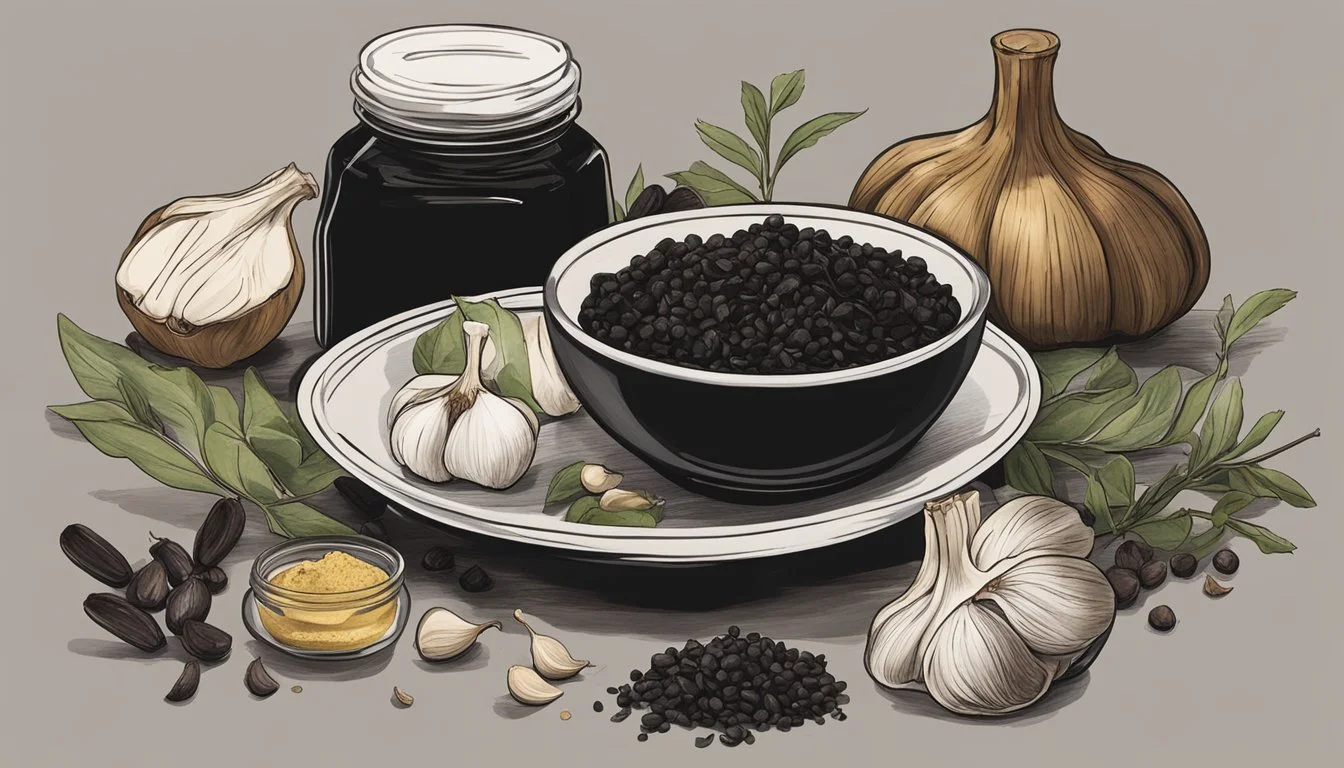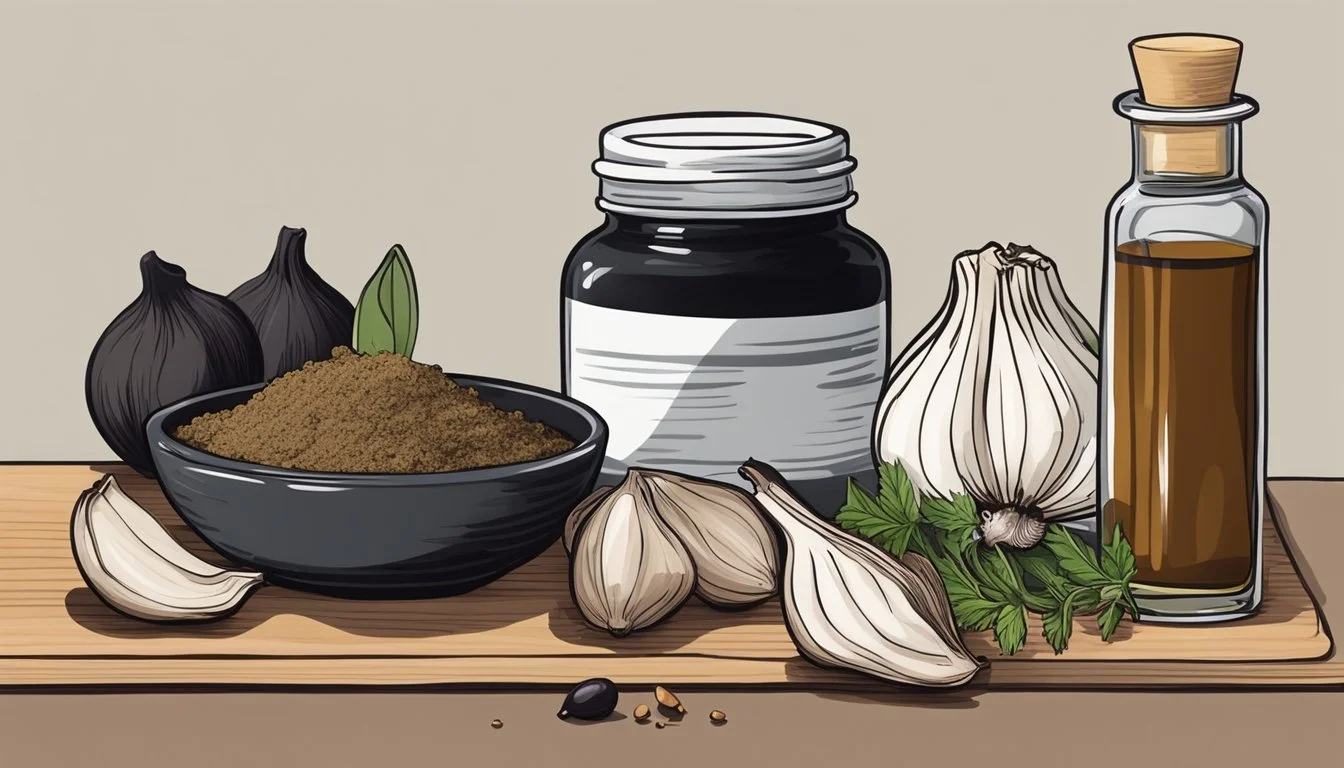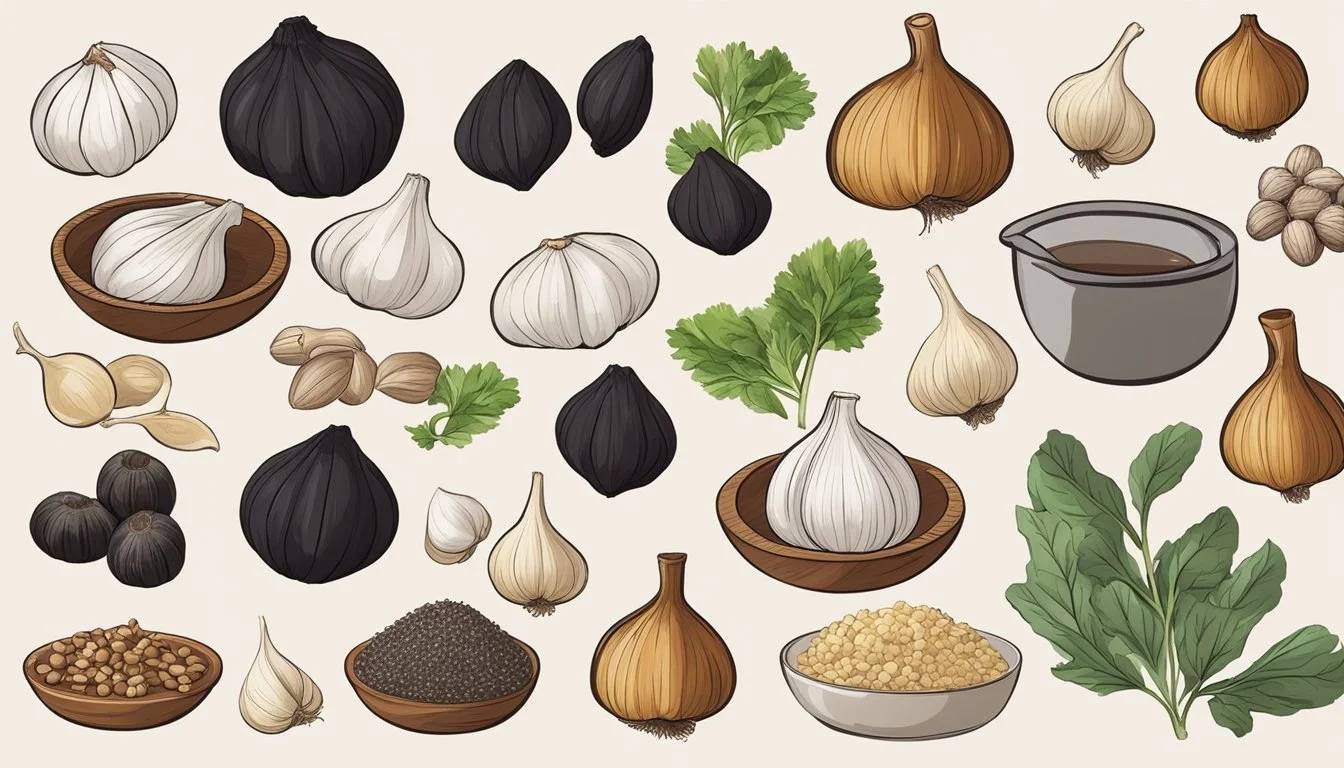Black Garlic Substitutes
Top Alternatives for Your Recipes
Black garlic is a unique ingredient known for its deep, sweet, and umami-rich flavor, achieved through a meticulous fermentation process. For those who can't find black garlic or prefer other options, several substitutes can offer similar taste profiles and convenience. One such option is 1/8 teaspoon of garlic powder per clove of black garlic, providing a comparable richness in flavor.
In addition to garlic powder, white garlic, garlic oil, and garlic paste serve as excellent alternatives. White garlic may not be as rich but still imparts the essential garlicky taste your dish needs. Garlic oil and paste are also practical, offering a ready-to-use convenience that seamlessly blends into dressings, soups, and marinades.
Black garlic is celebrated not only for its flavor but also for its health benefits, such as antioxidant properties. Substitutes like minced garlic or garlic salt, when used thoughtfully, can emulate some of these qualities, making sure your recipes remain both delicious and health-conscious.
Understanding Black Garlic
Black garlic is a unique ingredient known for its sweet, concentrated flavor and numerous health benefits. Its production involves a meticulous fermentation process, and it is highly valued in various culinary applications such as sauces, marinades, and dressings.
Origin and Production
Black garlic undergoes a fermentation process where raw garlic bulbs are kept in a controlled environment with high humidity and temperature for several weeks. This process transforms the garlic cloves into their black color and develops their signature sweet and tangy flavor. The texture becomes soft and chewy, unlike the crisp texture of regular garlic.
During fermentation, the natural sugars and amino acids present in garlic react to create compounds responsible for the distinct flavor profile and increased sweetness. This alteration also enhances its health benefits, such as improved antioxidant properties, which can help reduce inflammation and support immune function.
Culinary Uses
Black garlic is a versatile ingredient used to enhance various dishes, adding depth and complexity. It can be incorporated into sauces, marinades, and dressings to provide a sweet, umami flavor. Its concentrated flavor makes it an excellent choice as a sweetener in savory dishes.
In addition to these applications, black garlic can be spread on bread, mixed into soups, or used as a garnish for meats and vegetables. It pairs well with ingredients like soy sauce, vinegar, and honey, offering a unique twist on traditional recipes and making it a valuable addition to any chef's pantry.
Properties of Substitutes
Choosing the right substitute for black garlic involves understanding the flavor profiles and texture considerations of various alternatives. Some substitutes can offer similar depth and complexity, while others differ in impact.
Flavor Profiles
Black garlic is known for its sweet, umami flavor with hints of balsamic vinegar and tamarind. Several substitutes attempt to replicate this unique taste:
White Garlic: This offers a pungent, sharp taste but doesn't provide the same sweetness or umami. It's a versatile option and works well when cooked to mellow its intensity.
Garlic Powder: Using about 1/8 teaspoon of this can somewhat mimic the black garlic’s intensity. It gives a potent garlic flavor but lacks the sweet, complex notes.
Roasted Garlic: This is sweeter and milder than raw garlic, which makes it a closer match. The roasting process brings out caramelized flavors akin to black garlic.
Garlic Oil: Provides a concentrated flavor that spreads evenly through dishes. While not as complex, it offers a robust garlic essence.
Texture Considerations
Black garlic has a distinctive sticky, firm texture that several substitutes aim to emulate.
Minced Garlic: Often jarred, this is convenient but lacks the stickiness of black garlic. It has a chewy consistency but can be slightly abrasive if not cooked thoroughly.
Garlic Paste: This smooth, easily dissolvable form can integrate well in marinades and dressings. It replicates some of the sticky texture but is much more liquid.
Frozen Garlic: These small, golden cubes retain a firm texture when thawed, providing a somewhat similar bite. However, it doesn't achieve the same depth of flavor.
Roasted Garlic: It becomes very soft and spreadable after roasting. While it lacks the chewiness of black garlic, it offers a luxurious texture suitable for many dishes.
Black Garlic Substitutes
When you can't find black garlic, there are several substitutes to help ensure you can still achieve a rich, garlicky taste. Some alternatives include different forms of garlic and members of the allium family.
Garlic and Its Forms
Minced garlic is a convenient substitute, especially when you need to match the texture of black garlic. Use it directly from a jar, which saves time and provides a warm flavor similar to black garlic.
Garlic powder is another option. Begin with 1/8 teaspoon of garlic powder per black garlic clove and adjust as needed. Garlic salt combines garlic powder with salt. Use it carefully to manage the saltiness.
Garlic oil offers a subtler flavor but integrates seamlessly into sauces and dressings. Garlic paste, dissolving easily, is perfect for marinades, soups, and dressings. Start with 1 teaspoon per clove of garlic.
Other Alliums
Shallots are an excellent substitute for black garlic due to their mild, slightly sweet flavor. Minced shallots can replace black garlic in various recipes without overpowering other ingredients.
Leeks and green onions (also known as scallions) can provide a different, yet suitable taste profile. Use these mostly for their aromatic properties in soups, stews, and stir-fries.
Chives and garlic chives can also be used for garnish or finely chopped in recipes where you need a hint of garlic without the intensity. They’re particularly good for enhancing mashed potatoes or chicken dishes.
Additional Alternatives
White garlic is a primary substitute, although it lacks the complexity of black garlic. Adjust usage to avoid overwhelming your dish.
Onions and fennel seeds can add depth to your cooking. Use fennel seeds sparingly to mimic the sweet undertones of black garlic.
Truffle oil provides an umami flavor profile. It works best in small amounts to replicate the richness of black garlic. Remember that celery and cumin won’t provide a garlicky taste but can contribute to the overall spice and flavor balance.
These alternatives ensure you still achieve a delicious, well-rounded dish even without black garlic.
Considering Dietary Restrictions
Choosing black garlic substitutes involves navigating dietary restrictions, ensuring compatibility with gluten-free, allergen-free, vegan, and vegetarian diets.
Gluten-Free and Allergen-Free Options
Gluten-free and allergen-free substitutes are essential for those with celiac disease or food allergies. A suitable gluten-free substitute for black garlic is garlic-infused oil, offering similar flavor without gluten.
Avoiding common allergens is critical. Garlic scapes are a low-FODMAP option, as recognized by Monash University, and are low in allergens. Green parts of leeks provide mild onion flavor and are also low-FODMAP, making them suitable for those with digestive issues.
Drying and powdering alternatives like chives can retain flavor while being free from gluten and common allergens.
Vegan and Vegetarian Alternatives
Vegan and vegetarian alternatives exclude animal products. Garlic-infused oil is plant-based and imparts a garlic flavor without animal-derived ingredients.
Nutritional yeast introduces umami notes, often lost when avoiding black garlic. Green onions and spring onions offer suitable plant-based alternatives with less intense flavors.
Utilize these substitutes in recipes to maintain flavor and adhere to dietary preferences, ensuring dishes remain both flavorful and compliant with vegan and vegetarian diets. Adjust quantities slightly to match the potency of black garlic.
Tips for Choosing Substitutes
When selecting substitutes for black garlic, it's essential to consider multiple factors to ensure the desired flavor and texture in your dishes.
Flavor:
Garlic Powder: Use 1/8 teaspoon of garlic powder per clove of black garlic. Adjust to taste.
Garlic Salt: Incorporates salt, so be mindful of the extra saltiness it adds.
White Garlic: While it lacks the richness, it is an accessible alternative.
Texture:
Minced Garlic: Offers a convenient, jarred option with a warm flavor.
Garlic Paste: One teaspoon can replace one clove. It dissolves easily, ideal for marinades and soups.
Frozen Garlic: Cubes provide a seamless way to include garlic flavor.
Cost:
Garlic Powder: Affordable and widely available.
White Garlic: Cost-effective and easy to find.
Garlic Paste and Frozen Garlic: These can be pricier but offer convenience and specific uses.
Health Benefits:
Garlic Powder: Retains some, though not all, health benefits of fresh garlic.
Minced Garlic and Garlic Paste: Generally preserve the beneficial compounds of garlic.
White Garlic: Offers the closest health benefits to black garlic among substitutes.
Consider these factors to select the best black garlic substitute tailored to your recipe's needs.






